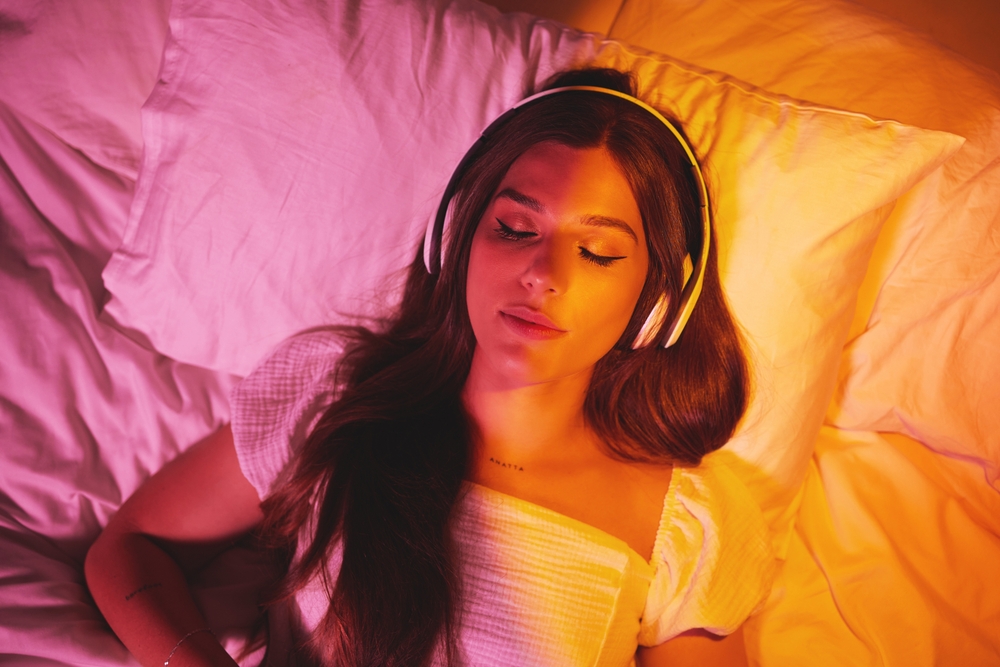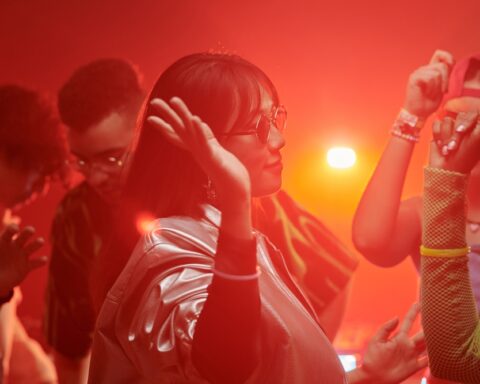There was a time when bragging about how little you slept was basically a badge of honor. Hustle culture taught us that four hours and a triple espresso meant you were “crushing it.” But somewhere between burnout, blue light, and billionaires swearing by their 8 p.m. bedtime routines, the script flipped: now, sleep is the ultimate status symbol.
Think about it, what used to be dismissed as “lazy” is now a marker of peak performance, glowing skin, and longevity. Ariana Huffington literally built an empire around it. Tech companies are racing to turn our bedrooms into mini sleep labs. TikTok has “sleepy girl mocktails” with millions of views. Even your watch is low-key judging your REM cycles.
But with all the hype, hacks, and hashtags, it’s easy to get lost. Is mouth taping genius or just a bizarre way to audition for a horror film? Do smart mattresses actually make you smarter in the morning? And why is everyone suddenly chugging cherry juice before bed?
The Science of Good Sleep
Before we dive into hacks, let’s get one thing straight: you can be in bed for eight hours and still wake up feeling like you got hit by a truck. What really matters isn’t just how long you sleep, but how well.
| Sleep Energy | How It Feels | Why It Hits Different | The Life Glow-Up |
|---|---|---|---|
| Brain Power Mode | Clearer thoughts, sharper focus | No more mental fog | Smarter decisions and quicker comebacks |
| Mood Stabilizer | Less snappy, more chill | Emotions don’t run the show | Relationships feel smoother |
| Glow-Up Fuel | Skin looks fresher, body feels lighter | Rest is the ultimate filter | You actually look like your best selfie |
| Productivity Boost | Energy lasts all day | Feels like doubling your time | More done in fewer hours |
| Stress Off Switch | Mind doesn’t race at night | Waking up feels easy | Calm mornings that set the tone |
| Immune Shield | Body fights back stronger | You bounce back faster | Sick days don’t own you anymore |
Meet Your Circadian Rhythm
Your body runs on a circadian rhythm – a 24-hour internal clock that, when synced, makes you feel like a smooth-operating human. When it’s out of whack (thanks to late-night doomscrolling, jet lag, or that 4 p.m. iced coffee), your sleep quality tanks.
Within your nightly hours, you cycle through stages: light sleep, deep sleep (aka body repair mode), and REM (where your brain files memories, solves problems, and dreams up the weird stuff). Miss deep sleep, and your body feels sluggish; skimp on REM, and your brain’s basically running on empty.
Busting Sleep Myths
No, you cannot “train yourself” to thrive on five hours a night. Chronic sleep debt hits mood, metabolism, and even immune function. Weekend catch-up naps? Nice in theory, but your brain isn’t a savings account; it won’t erase a week of midnight Netflix binges.
Small Tweaks, Big Results
So it turns out that small, targeted tweaks can dramatically improve the quality, not just quantity. Consider this your crash course in treating your body like the high-performance system it is.
The Viral Sleep Trends
Mouth Taping: Miracle or Madness
Yes, it’s exactly what it sounds like – slapping a strip over your lips at night to force nasal breathing. Fans swear by better oxygen flow and snore reduction. Science? There’s some evidence nasal breathing can improve sleep quality, but the jury’s still out on whether mouth taping is a universal solution. But don’t try it out if you have sleep apnea or nasal congestion. That could end badly.
The 4-7-8 Breathing Hack
This one’s simple: inhale for 4 seconds, hold for 7, exhale for 8. Longer exhales trigger the parasympathetic nervous system, the body’s chill mode. In this way, your brain gets the memo that it’s time to switch off. TikTok loves it for a reason, and unlike mouth tape, it’s low-risk and more subtle to do next to a new “sleeping partner”.
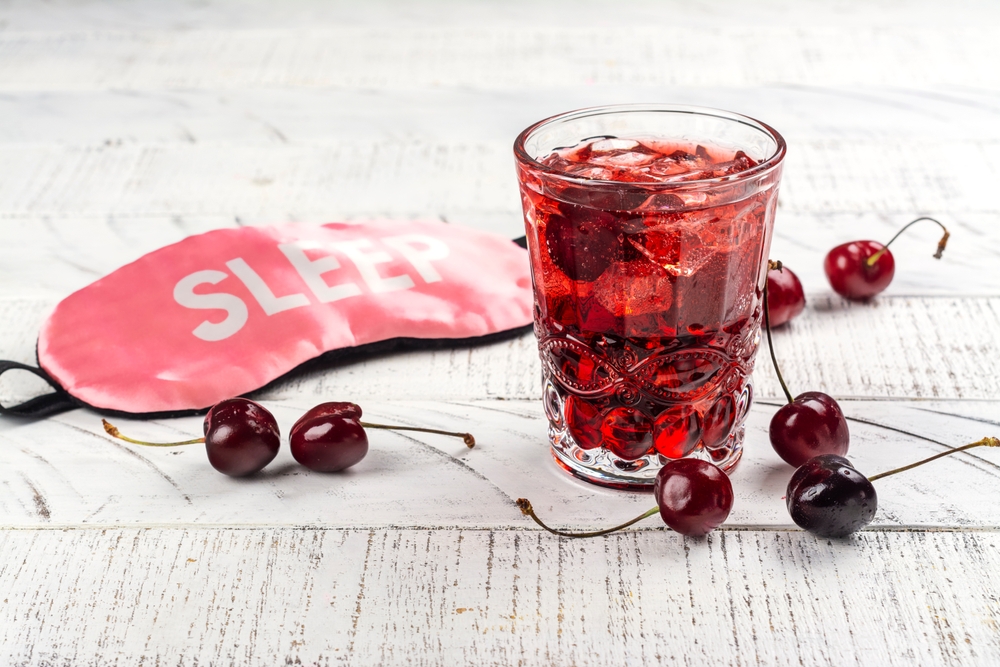
Sleepy Girl Mocktails & Tart Cherry Juice
Magnesium, tart cherry juice, a drop of honey – voilà, the latest “natural sleep elixir.” Research shows tart cherries are rich in melatonin precursors, and magnesium glycinate can relax muscles. Not magic, but a gentle nudge in the right direction. The bonus is that it looks adorable on your Instagram stories.
Cold Plunge Before Bed: Chill Out or Psych Out
Cold showers and ice baths are trendy for a reason, they spike alertness, improve circulation, and boost recovery. But timing is key: doing it too close to bedtime can backfire, leaving your body too energized to sleep. Early evening is your sweet spot if you’re chasing that icy wellness aesthetic.
Worth It / Skip It
- Mouth taping: Maybe… but only if you’re doing it safely.
- 4-7-8 breathing: Totally. Always. Even one minute can help.
- Tart cherry magnesium mocktail: Worth a shot; it’s tasty and low-risk.
- Cold plunge: Early evening only, unless you enjoy staring at the ceiling.
So, viral doesn’t always mean valid, but some of these trends have solid science tucked behind the hype.
High-Tech Hacks: From NASA to Your Nightstand
Smart Mattresses: The Bed That Knows You Better Than Your Ex
Mattresses used to be… boring. Now? They track your heart rate, body temperature, even how often you toss and turn. Brands like Eight Sleep and Sleep Number promise thermal regulation and data dashboards that break down your sleep “health” into granular detail. For some people, these actually help identify hidden issues (like overheating at night). For others, it’s just another way to stress over numbers. Which brings us to…
Sleep Trackers: Friend or Frenemy?
Oura Rings, Apple Watches, WHOOP bands – they’re the new sleep police. Tracking can be motivating (“look at all that deep sleep!”) but can also trigger what scientists call orthosomnia, basically, insomnia caused by anxiety about not sleeping enough. If your data fuels better habits, amazing. If it fuels panic, maybe ditch the wrist bling at night.
Smart Lighting: Sunsets on Demand
Lighting hacks aren’t just for influencers with vibey apartments. Smart bulbs can mimic natural sunset colors at night and gradually brighten in the morning, nudging your circadian rhythm back in sync. Think of it as tricking your brain into believing you live in a perfectly lit Instagram reel, 24/7.
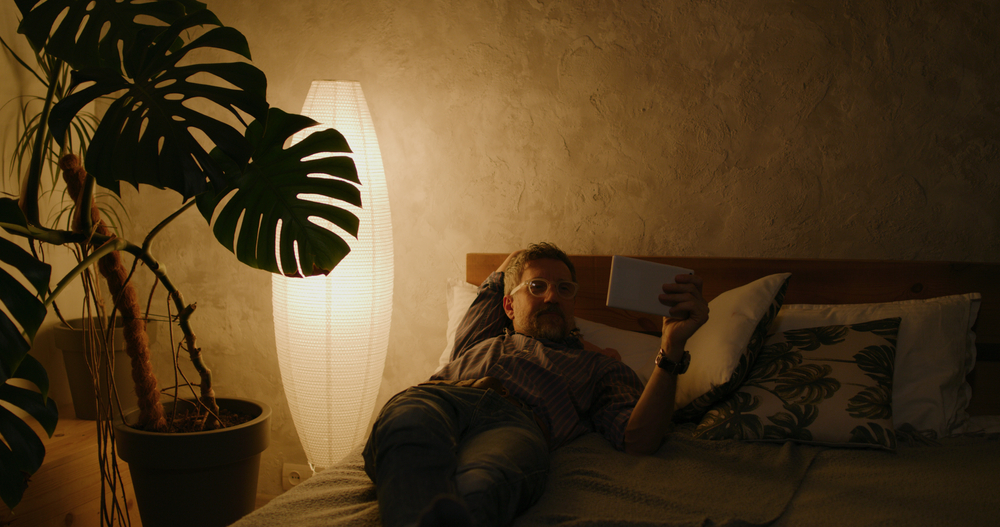
The NASA Connection
Fun fact: a lot of this tech was first tested on astronauts and elite athletes – people who literally cannot afford bad sleep. If your Fitbit feels a little over the top, just remember it’s basically space gear scaled down for Earth.
Worth the Upgrade?
- Smart mattresses: Great if you’re a data lover or run hot/cold at night.
- Trackers: Useful, but don’t obsess.
- AI soundscapes: Surprisingly effective and low effort.
- Smart lighting: A worthy investment if your sleep-wake cycle is chaotic.
Technology can absolutely elevate your sleep game, but it should feel like a helper, not a hall monitor.
Surprising Low-Tech Habits That Work Better Than You’d Think
Keep It Cool (Literally)
You’ve probably heard that the “ideal” bedroom temperature is around 65°F (18°C). Turns out, that’s not just Pinterest wisdom, it’s biology. Your core body temp naturally drops at night to signal sleep. A chilly room helps you ride that wave, while a hot one makes your body think it’s still in hustle mode. If you’re waking up sweaty at 3 a.m., your thermostat might be the real villain.
Caffeine Curfew
Hate to break it to you, but that innocent 2 p.m. iced latte is still messing with your night. Caffeine has a half-life of up to 6 hours, meaning half of it can still be buzzing in your system come bedtime. So yes, you may fall asleep, but your sleep quality tanks. A good rule is to cut caffeine after lunch, unless you enjoy that groggy, wrong-side-of-the-bed feeling every morning.
Sunlight is the OG Sleep Hack
Morning sunlight is like hitting the reset button on your circadian rhythm. A quick 10–20 minute walk outside tells your brain, “Hey, it’s daytime now,” which helps your body know when to start winding down later. Think of it as free chronotherapy with bonus Vitamin D.
Movement Matters (But Not Too Late)
Regular exercise boosts sleep quality, but doing an intense workout right before bed can have the opposite effect, your body’s still revved up on adrenaline. Early morning or afternoon movement is your best bet. It also makes that evening wind-down feel extra delicious.
Baby Your Brain with Rituals
Your brain is basically a toddler – it thrives on cues and routines. A screen-free hour, a quick journal entry, or even brushing your teeth at the same time each night tells your mind “We’re powering down now.” It’s not about the ritual itself; it’s about the ritual itself; it’s about training your brain to associate the act with sleep.
Worth Remembering
You don’t need a $2,000 smart mattress to improve your sleep. Sometimes the cheapest hacks – like turning down the thermostat, skipping that late latte, and catching some morning sun – are the ones that make the biggest difference.
Food, Drink, and Supplements: What to Actually Trust
Melatonin: The Jet Lag Fix, Not a Lifestyle
Melatonin is the most famous “sleep supplement,” but here’s the truth: it’s not a magic nightly pill. Your body already makes melatonin naturally in response to darkness. Supplements can help reset your clock when you’re jet-lagged or working shifts, but overuse may actually confuse your system. You only need it when you’re off course, not as part of your everyday routine. It can also interact with other medications and caffeine, so should be taken with caution.
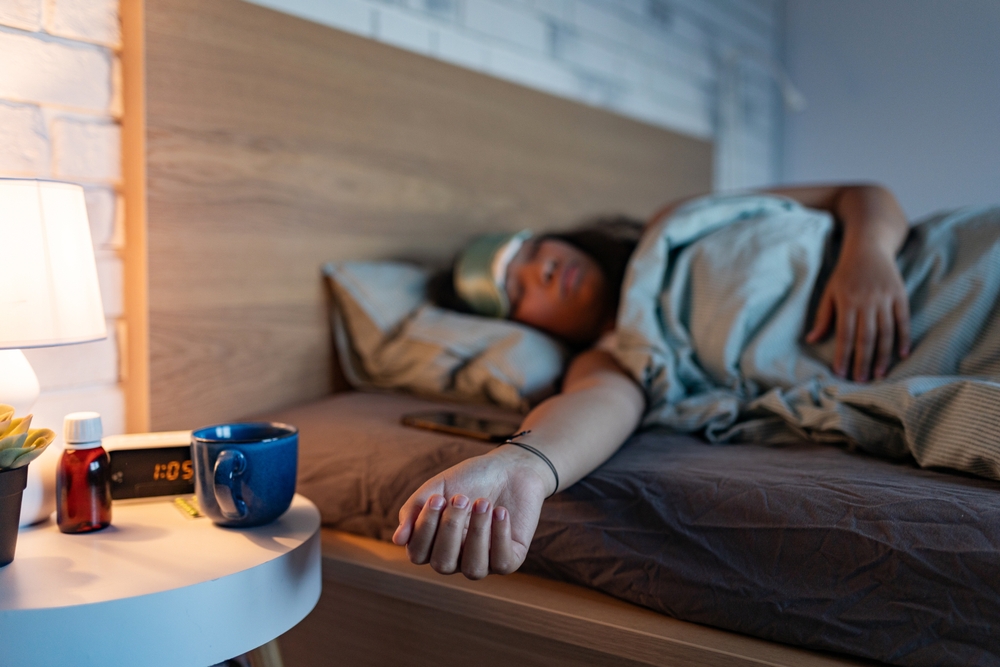
Magnesium: TikTok’s Science-Backed Golden Child
If you’ve seen wellness influencers sipping “sleepy girl mocktails”, you’ve met magnesium. Specifically, magnesium glycinate – the form that’s easiest for your body to absorb. Science says magnesium helps regulate neurotransmitters that calm the nervous system. Therefore, it makes it easier for your brain to hit the brakes. And unlike melatonin, it’s more of a steady supporter than a quick fix.
Tart Cherry Juice: Small Fruit, Big Buzz
Tart cherries contain tryptophan and melatonin precursors, and several small studies show they can modestly improve sleep quality. Is it going to knock you out cold? No. But sipping a glass before bed may help your body ease into rest, and it’s way cuter than popping a pill.
Alcohol & Edibles: The Sneaky Saboteurs
Yes, a nightcap or THC gummy might help you fall asleep faster, but the trade-off is brutal: disrupted REM sleep, shallow cycles, and waking up feeling like you didn’t sleep at all. Basically, they trick you into thinking they’re your friend while stealing your good sleep behind your back.
Snack Smart
On the food front, heavy meals right before bed can tank your rest, but light snacks (think bananas, nuts, or yogurt) can be sleep-friendly. The key is balance: you want to nudge your body into relaxation, not send it into digestion overdrive.
The Bedroom as a Sleep Sanctuary
Darkness is Your Superpower
Your body is basically a solar-powered machine, it responds to light cues. That’s why blackout curtains, anti-blue light screens, or a decent sleep mask can make a huge difference. Even tiny amounts of light (like that glowing Wi-Fi router in the corner) can mess with melatonin production. Darkness tells your brain: “It’s safe. It’s bedtime. Let’s power down.”
Weighted Blankets & Cozy Cues
There’s legit science behind weighted blankets. The gentle pressure can reduce cortisol (your stress hormone) and increase serotonin, which sets you up for better sleep. It’s like being swaddled, but make it chic. Pair it with high-quality bedding that feels like a hotel upgrade, and suddenly your bed becomes a place you want to fall asleep in.
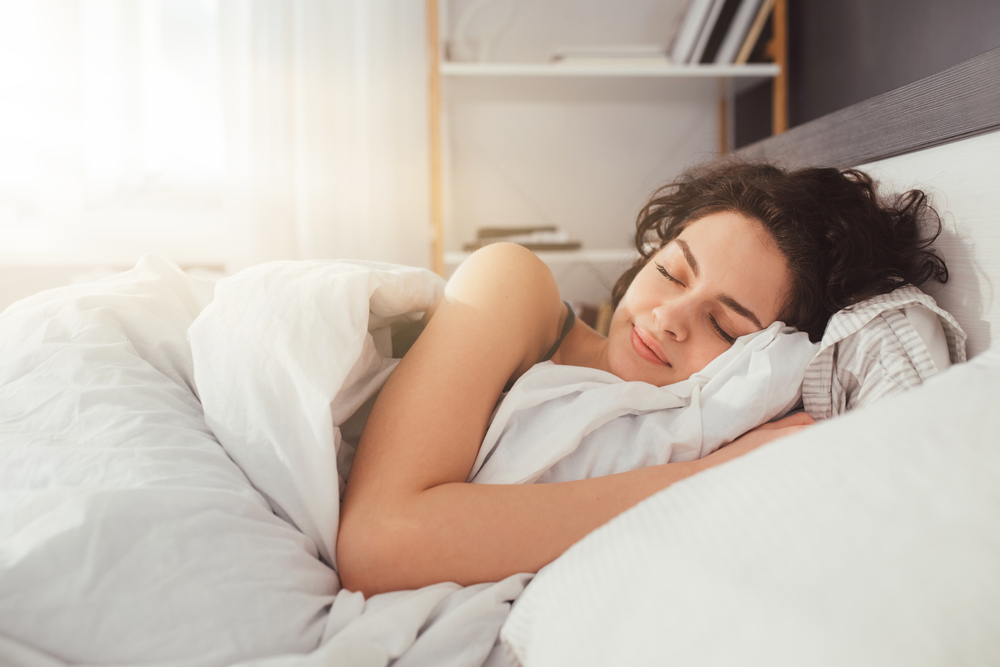
The Scent of Sleep
Aromatherapy isn’t just hippie hype. Lavender and chamomile scents have been shown to promote relaxation and reduce anxiety. Whether it’s a diffuser, pillow spray, or just brewing a calming tea, your brain learns to associate that smell with winding down. It’s Pavlov, but for bedtime vibes.
Lights Out (For Real)
Blue light is the enemy of melatonin. If you’re scrolling TikTok under bright LEDs, your brain thinks it’s noon in July. Swap to warm amber lighting in the evenings to mimic sunset cues. It’s a small shift with big payoff.
The Golden Rule
Your bedroom should have two jobs: sleep and intimacy. That’s it. If you’re answering emails, watching TV, or doomscrolling in bed, you’re basically training your brain to associate it with stress. Treat your room like a sanctuary, not a second office – and your sleep will thank you.
The Mind Game: Training Your Brain to Switch Off
Ever crawl into bed only to have your brain pull up a greatest-hits reel of embarrassing moments from 2009? Classic. That’s because lying down in silence often gives your mind the perfect stage for overthinking. The trick isn’t to “force” sleep, it’s to redirect the mental energy.
Paradoxical Intention: Try to Stay Awake
Sounds backwards, but research from cognitive behavioral therapy for insomnia (CBT-I) shows that trying not to sleep can reduce performance anxiety. Basically, the more you pressure yourself to sleep, the less it happens. Instead, give yourself permission to “just rest” or even play a mental game (like silently listing dog breeds). Ironically, that relaxation usually ushers in sleep faster.
Relaxation Hacks That Actually Work
- Progressive muscle relaxation: Tense and release each muscle group from toes to forehead. It tricks your body into letting go.
- Guided meditation or sleep stories: Yes, the Calm app narrators are weirdly effective.
- Breathwork: Slow, deep breathing (like that 4-7-8 method we met earlier) tells your nervous system it’s safe to switch off.
Stress Hormones: The Real Villain
Cortisol (the stress hormone) is basically caffeine your body makes on its own. If it’s elevated at night, you’re wired, not tired. Mindfulness practices (journaling, gratitude lists, light meditation) lower cortisol and create mental closure for the day. Think of it as hitting “save and quit” on your brain’s endless tabs.
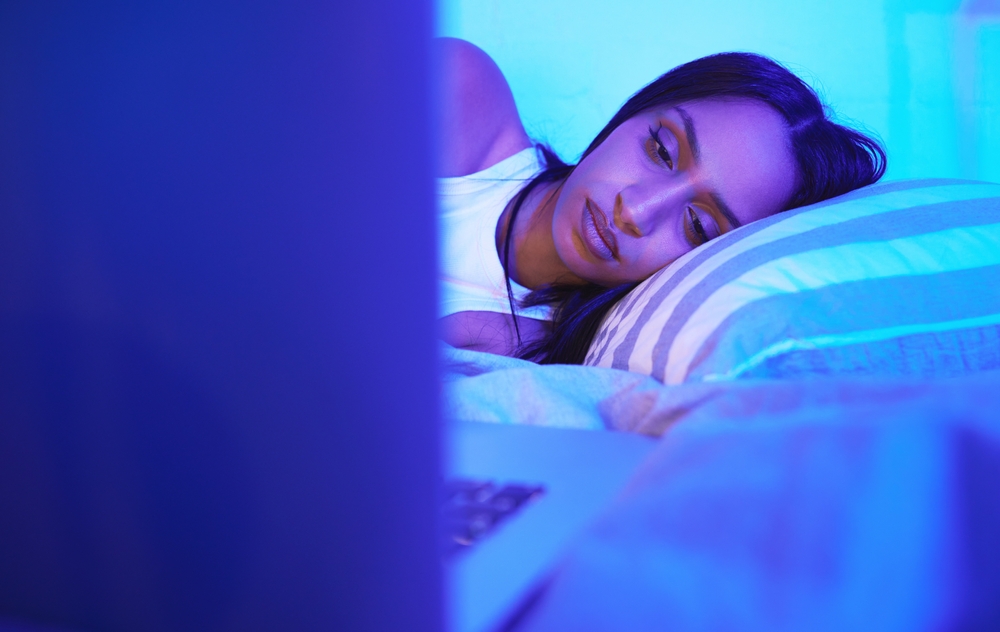
The Future of Sleep: What’s Coming Next
Brainwave Tech
Imagine slipping on a headband that nudges your brain into deep sleep using gentle electrical pulses. Sounds sci-fi, but prototypes already exist. Companies are experimenting with wearable devices that sync with your brainwaves, boosting the restorative stages of sleep on demand.
Lab-Grown Dream Aids
Supplements are also getting a glow-up. Scientists are working on melatonin alternatives that act more like dimmer switches than sledgehammers, fine-tuning your sleep cycle without the groggy side effects. Think “precision medicine,” but for your circadian rhythm.
Smart Homes That Tuck You In
Your thermostat, lights, and even bedding will soon talk to each other – automatically cooling, dimming, and adjusting based on your personal sleep data. Basically, your bedroom becomes your night-nurse, making sure that your environment is perfectly set before you even yawn.
Sleep as Longevity Medicine
Here’s the bigger picture: researchers are treating sleep not just as rest, but as a lever for healthspan. We’re talking tech that can spot early signs of disease through sleep data, or therapies designed to extend life by optimizing nightly repair.
The future of sleep isn’t just about better nights, it’s about better decades.
Get Your Sleep On
Sleep isn’t just something you have to do, it’s the ultimate form of self-care. Better than a jade roller, more powerful than a green juice, and way cheaper than another “miracle” supplement. Good sleep upgrades everything, from your mood, to your focus, your skin, and even how long you live.
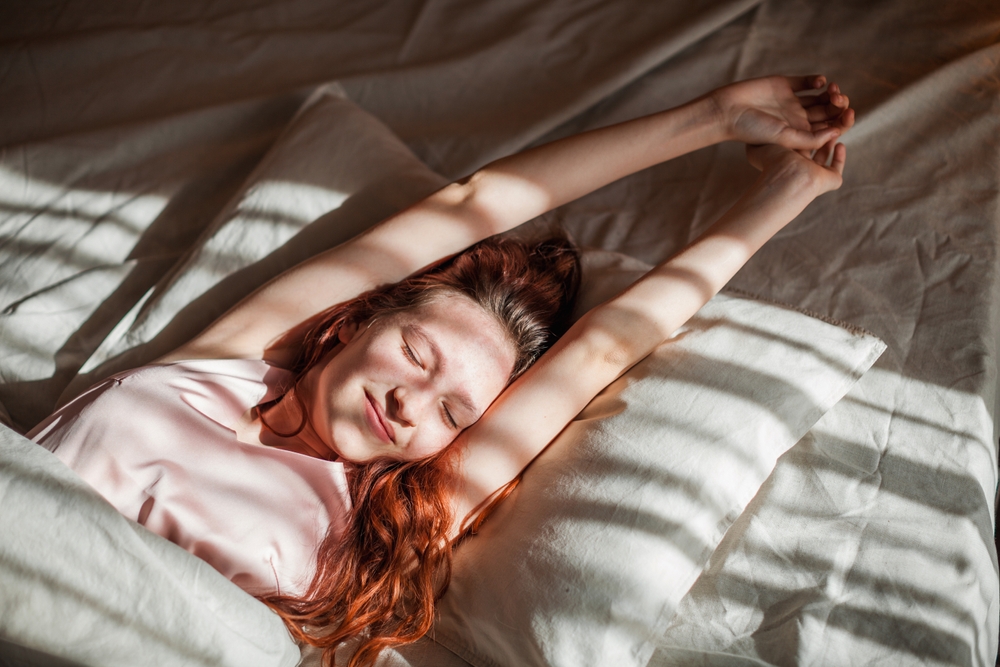
The best part? You don’t need to overhaul your life to get there. Start with one or two hacks tonight, maybe swap the 2 p.m. coffee for a walk in the sun, dim the lights an hour earlier, or give that 4-7-8 breathing trick a spin. It’s less about chasing perfection, and more about stacking small, doable changes that add up to real results. And remember: your bed isn’t a productivity zone, a late-night TikTok theater, or a snack bar. It’s your sanctuary. Protect it.
Because at the end of the day (or rather, at the end of the night) you wouldn’t ghost your best friend. So don’t ghost your pillow. Your future self will thank you.

